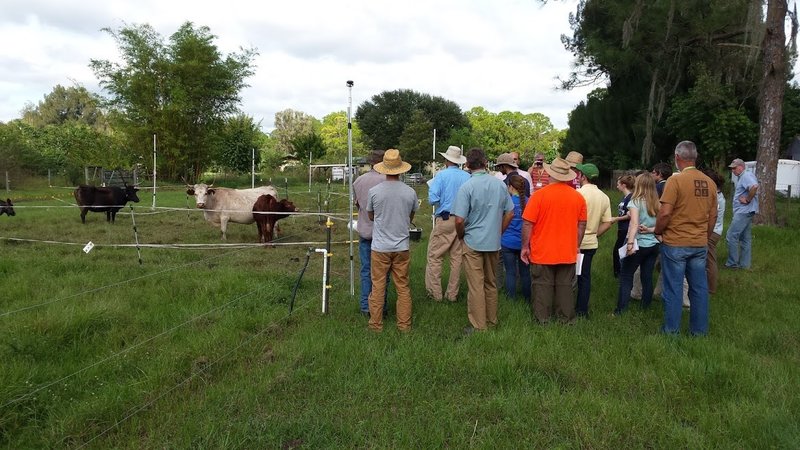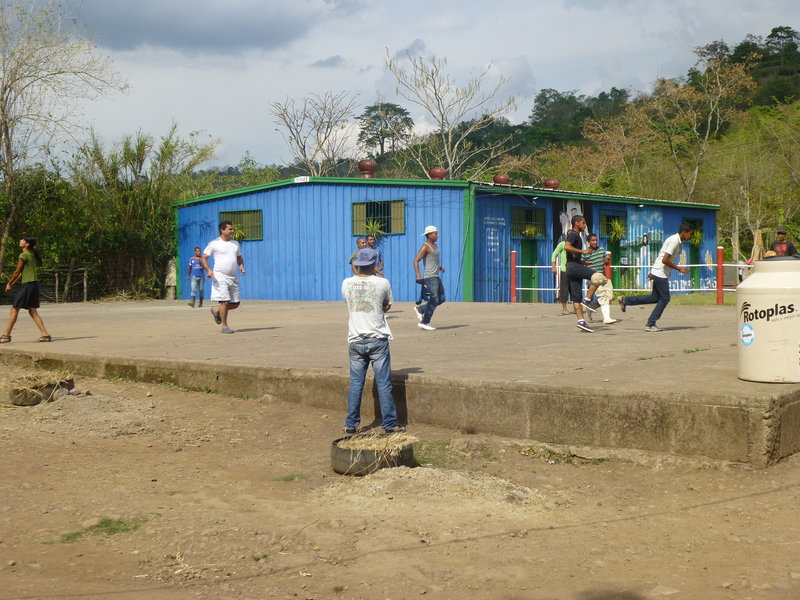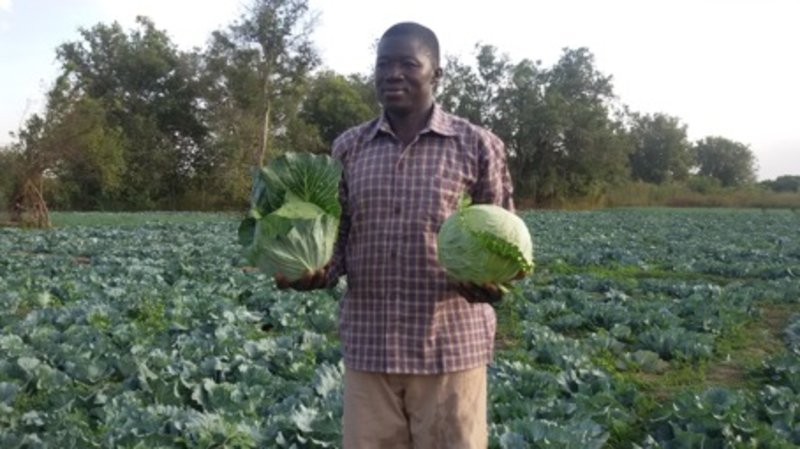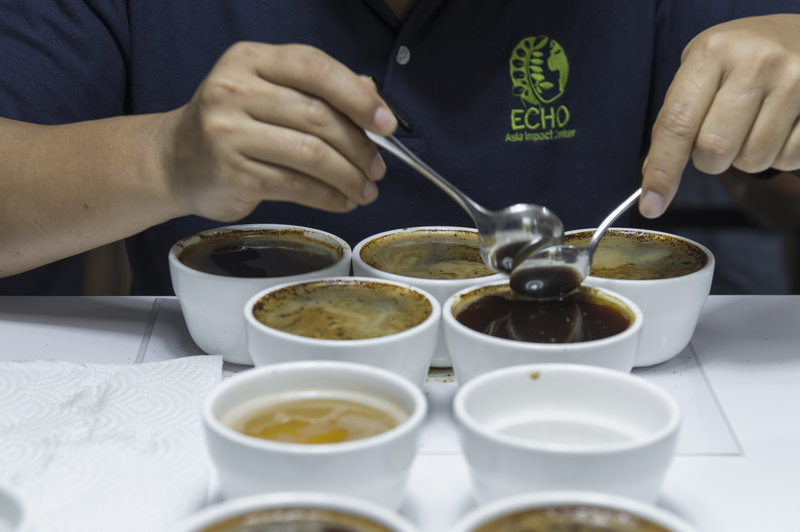Habari mpya za ECHOcommunity
Syringe Vacuum Pump: An appropriate technology for seed saving which is suitable for smallholder farmer. 2016-08-09
Vacuum-sealing seeds is highly effective, but the technology to do it is often out of the reach of small-scale farmers. This one dollar solution can help small-scale farmers store seeds more reliably, improving seed viability and reducing loss.
This research was done in Cambodia as part of "Seeds of Hope: Connecting Seeds, Livelihoods, and Poverty Alleviation with Marginalized Smallholder Farmers" which was conducted by ECHO Asia, International Cooperation Cambodia (ICC), and Ntuk Nti Small Farm Resource Center, in Mondulkiri and Ratanakiri Provinces, Cambodia.
Support for this project was made possible by the generosity of the Presbyterian Hunger Program from the United States of America.
Yohana Mcha’s Hay Baler benefits her Orkolili neighbors 2016-08-02
Yohana Mcha, headmistress of Orkolili Secondary school is an innovator who received a Pico grant in 2015 from ECHO through the IDIN program. She attended an innovation summit organized in Arusha in August 2014 at which she learned of the challenge she wanted to solve in her area: a way to store animal fodder plenty during the rainy season (March to June) and very scarce during the dry season (July to October and January to February). She decided to create a simple hay baler, a box using timber, which was completed during August last year. It was not fully used since at that time there was scarcity of grass. However, from March thru June this year her area received good rainfall and a bumper grass crop was grown ready for harvest.
Yohana and her neighbors used her box baler to make a pile of hay bales in her compound, stored ready to be used by her cattle during the dry season. She has seven cattle of which 5 are pregnant which need much grass for feed. She is happy about the simple hay baler she created and the way it has become an effective tool for her animals. Three neighbors have visited her this season and after seeing what she did with the box they borrowed it to make their hay; now they have promised to construct their own balers.
Digging Deeper: Rotational Grazing 2016-07-15
Since 2014, the ECHO Farm in North Ft. Myers, Florida has been upgrading and expanding its pastures using the managed, rotational, intensive grazing model. With paddocks sub-divided by electric fencing, cows and goats are moved regularly and systematically from intensively grazed plots to fresh, recovered sections of pasture. This regular rotation prevents overgrazing and enables a healthy rapid recovery of each grazed cell.
This rotational grazing model was recently taught at ECHO by Andre Houssney, a farmer and international development worker. Additionally, Tre’ Cates, a 2015 conference plenary speaker representing the Savory Institute (co-founded by Allan Savory), shared about Holistic Land Management. This sustainable grazing system is being widely applied toward the restoration of the world’s grasslands.
Making use of our new grazing facility and other farm resources, during September 20-13, 2016, ECHO will be hosting the Introduction to Small-Scale Livestock Production in the Tropics workshop. Besides sharing the basics of managed, rotational, intensive grazing, other topics will include deep-litter pig systems, production of silage and other feeds, forage plant identification, animal health and harvesting. For more information
Voices From Our Network - East Africa 2016-06-28
"Agriculture is important to me because if I can share what I know about farming with my village, maybe they will learn from me and our lives will be better. At ECHO demonstration gardens, we learned what vegetables grow well with little water in case there is a drought, and we learned new and better ways of farming. Everyone needs to have skills about something so they can share with theIr community. In my community, many people are farmers but they don't always know the best ways to produce."
– Mathayo, 10th Grade student leader in Orkeeswa Secondary School's agriculture club
Integrated agriculture serves rehabilitation ministry in more ways than one 2016-06-02
Rick Ervin is a veterinarian working in Nicaragua. Since 2006 he and his wife Mary have been involved in a drug and alcohol rehabilitation ministry near Tuma-La dalia. At the ministry’s small farm men and women who have little or no financial resources receive care and chance to make a new start. The farm integrates animal systems including rabbits, laying hens and dairy goats with traditional crops such as corn and beans.
Latin America and ... Institutional Agri... Institutional Agri...
Guest Post: Travis Silveus - Peace Corps Volunteer, Tanzania 2016-05-24
Travis Silveus is a Peace Corps Volunteer who is extending for his 3rd year in Tanzania by working with ECHO East Africa. He did his two year work in Kijunguvillage, Kiteto, Manyara Region, and here he shares some honest experiences of that time.
"In my village, deforestation is a problem. If a tree doesn't produce edible fruit or look beautiful with showy flowers, it's usually on its way to becoming firewood. The two years I lived in Kijungu I saw the tree line slowly creep up the mountain behind my house as families would send girls to cut and collect tree branches. I talked with the environment group, a small group of concerned villagers, but our plans to start a tree nursery were put on the way side until the rains came and then eventually forgotten...
East Africa FMNR African Moringa Tanzania Peace Corps Deforestation
ECHOcommunity Member Profile: Pastor Florentin 2016-05-03
This week's blog post is from guest writer Robert Sanou. Robert is the director of the ECHO West Africa Regional Impact Center in Ouagadougou, Burkina Faso.
The pastor who brings change in his environment
It was an afternoon of March that I received a call from Pastor Florentin. His name reminded me nothing; but he told me he had participated in the forum of ECHO in January 2015 in Ouagadougou. He invited me to come and see the fruit of "your job."
In Africa this phrase has two meanings:
- Either that you did a good job and you come see the beautiful fruit
- Or that you have not worked well and you will also see the consequences.
But he assured me that it was a good job.
ECHO forum has opened more his eyes on gardening and he wanted us to come and see the difference.
Pastor Florentin lives in Zangoma at about 65kms from Bobo-Dioulasso the second city of the country.
The pastor met us at the roadside before leading us in his garden. The garden is almost one hectare. He has produced onions, cabbage and zucchini. A very beautiful garden, with vegetables in very good shape.
Florentin says he participated in the forum of ECHO through a scholarship He has been practicing gardening since but the forum was a beautiful opportunity to better understand the work of the garden and the interest of a garden.
We were very amazed by the beauty of the fields; He had still not begun harvesting but he was expecting a good sale in this year.
Florentin has also encouraged the members of his Church to the gardens. After his garden, he leads us in gardens of members of his Church.
Beyond the Church, Florentin shares his knowledge of gardening with the people of his village.
This is exactly the spirit of sharing of ECHO.
ECHO Asia Coffee Network - First Coffee Cupping 2016-04-26
The first ECHO Asia coffee cupping was organized on March 10, 2016 at the Torch Coffee Lab located on the second floor of Omnia Café & Roastery in Chiang Mai, Thailand. Zachary Price, ECHO Asia Technical Advisor and Q-grader (certified coffee cupper) led the activity and also shared some knowledge about the SCAA (Specialty Coffee Association of America) cupping protocols, coffee processing, and tasting.
The purpose of this event was to host a small gathering of local ECHO network members, nonprofits, and business owners who work with smallholder coffee farmers—in order to share knowledge and skills needed in evaluating coffee. Each participant was asked to bring 100 grams of light roasted coffee beans for the cupping in order to analyze the quality of the beans and to discuss the attributes of each coffee.
ECHO Asia is working to support and strengthen the capacity of our network members in Asia where high value niche crops such as coffee have become of economic importance. Developing the skill of cupping coffee in order to evaluate its quality and unique characteristics is essential in helping ECHO network members succeed in endeavors to empower smallholder farmers. The end goal is to equip these farmers with the knowledge needed for high-value specialty coffee production. If ECHO network members understand how to produce and evaluate quality coffee it will enable them to speak up for fair treatment of smallholder farmers within the coffee industry, and guide these farmers to a more sustainable path. ECHO Asia Technical Advisor, Zach Price, works with NGOs and coffee business owners who work with smallholder farmers to provide both knowledge and skills that they can, in turn, share with the farmers they work with. Future trainings centered on topics such as best agricultural practices for coffee production, coffee processing methods, and coffee evaluation are all a part of ECHO Asia’s plans to better equip our network.
Thailand has established itself as one of the major coffee producers of Southeast Asia, producing an average of 900,000 60 kilograms bags of coffee each year since 2004. Thanks to the work of the Thai Government and the Royal Project, as well as domestic and international coffee companies, Thai farmers now have access to several coffee varieties and basic production knowledge.
Internationally, 80% of the world’s coffee is grown by smallholder farmers, 50% of those farmers are living in poverty and are able to provide basic living necessities for their families. As the international coffee market is beginning to push for speciality coffee and higher quality coffee, as opposed to commodity coffees or instant coffees, there is substantial opportunity for smallholder farmers to increase their position and benefit from the market.
One of the core areas of the ECHO Asia Foundation’s mission is to provide technical training, materials, and support to community development workers, organizations, grassroots networks, and farming cooperatives in Southeast Asia so that they can reduce hunger and improve the lives of poor farmers in the region. As a part of this mission, by training smallholder coffee farmers and the community development workers that support them with additional knowledge and skills to increase the quality of their coffee, ECHO Asia seeks to empower these farmers to increase the selling price of and be able to compete against other internationally recognized speciality coffees. In order to achieve these goals, involves training that focuses on farming practices, harvesting practices, processing methods, and sensory skills for farmers to be able to evaluate their own coffee. More training for farmers about speciality coffee means not they are both less vulnerable to be exploited by coffee purchasers and able to improve their crop and coffee product.
Currently, ECHO Asia is looking to identify interested network members to become a part of an “ECHO Asia Coffee Network.” This network will be contacted for upcoming trainings and events, receive first notice of resources pertaining to coffee, be notified of availability for coffee consultations from ECHO, and connect with organizations doing similar work and facing similar challenges. To sign up for this network, please fill out this form today!
https://docs.google.com/forms/d/10G3SLZ3eVH5yfTOxkcQfm3Nkhr8QXgOpXB2XmY4Nymk/
EDN Issue 131 - Now Available 2016-04-08
In This Issue:
- Kitchen Gardens in Burundi – "the new way to grow vegetables"
- Use of Moringa Leaf Extract as an Effective and Easy Crop Growth Enhancer
- Echoes From Our Network - Roland Bunch, Five Years in Africa
- From ECHO’s Seed Bank: Legume Seed Highlights (See PDF Version)
- Books, Websites and Other Resources (See PDF Version)
Kitchen Gardens in Burundi – “the new way to grow vegetables”
by Sara Delaney, Senior Program Officer, International Programs, Episcopal Relief & Development
Sara Delaney presented at ECHO’s November 2015 International Agriculture Conference. One project she mentioned had remarkable adoption rates, and we thought it would make a good case study to share in EDN. In the course of introducing new ideas or practices, why are some accepted more easily, quickly or widely than others? This article proposes some reasons for the initial success of kitchen gardens in Burundi, and also shares a method for trying to measure the impact that kitchen gardens will have on the food security and nutrition of the families who use them.
Excerpt: "The kitchen garden model has many benefits. It requires only a small area, and can be made inexpensively or even at no cost by using readily available or recycled materials. The design can easily be modified. The garden is supplied with nutrients by the compost basket in the center. Especially when mulched, the garden requires less water than a typical garden.
"PEAB and IARD led a series of trainings on kitchen garden construction techniques, and then—following construction—on composting, crop management, seed saving, nutrition, and cooking techniques. Each household received 4 to 10 training sessions, over a period of two or three months. Staff later followed up with visits that included opportunities to receive advice and troubleshooting."
Download and share ECHO Development Note #131
Network Member Profile: Semilla Nueva 2016-04-05
The mission of Semilla Nueva is to develop locally-led farmer education programs that increase the income, rebuild the soils, and improve the food security of Guatemala’s rural poor. This ECHOcommunity network member organization is using farmer-to-farmer training to empower farmers with the knowledge and tools they need to experiment with new, sustainable, techniques and to share their results with others.
Guatemalan small-scale farmers are in need of improved access to nutritious crops. Semilla Nueva is helping to provide seed and support for three specific crops: Chaya, Pigeonpea, and Quality Protein Maize.
Chaya, or tree spinach, is perennial source of protein native to the region. Chaya has been a traditional source of protein for the Mayan people, and the plants can be used as natural fencing. Through nutrition programs and cooking classes Semilla Nueva is working with Guatemalans to increase the growth and consumption of this nutritious vegetable.
Maize is a major food source for Guatemalans, however reliance on low-protein varieties for a large part of their dietary intake has contributed in no small way to malnutrition and stunting in some populations. Semilla Nueva is researching and promoting a variety of Quality Protein Maize (QPM) that has been bred to be a complete protein source. With 90% of the protein of milk, QPM is a non-gmo corn variety that can be used to increase the diversity of Maize available and improve the nutritional value of traditional meals.
Along with new varieties of Maize, Semilla Nueva is promoting the agricultural practice of intercropping, specifically focusing on growing Maize and Pigeonpea in the same field. Another traditional crop, Pigeonpea is a highly nutritious bean that grows well between rows of Maize as a green manure cover crop, improving the soil through fixing atmospheric nitrogen.
Latin America and ... Chaya Maize Quality Protein Maize Green Manures and ... Pigeon Pea









